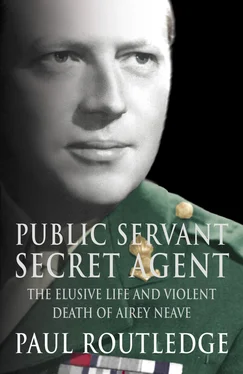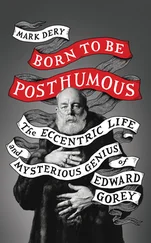Theirs was not the first escape bid. Several other officers had tried to get out of Spangenburg, and three Canadian flying officers dressed in fake Luftwaffe uniforms had almost succeeded in stealing a German aeroplane to fly to neutral Sweden. They had swapped places with men on an outside working party to reach the aerodrome and were only detected by their ignorance of German. Tougher controls on movement in and out of the fort were introduced after that but Neave was undeterred. He bought a workman’s coat and pair of trousers from a British officer who had given up thoughts of escape to read for a law degree, and a fellow officer with artistic skills made him a forged civilian pass, identifying him as a carpenter from the town of Bromberg.
Neave was not very thorough in his escape plans. For instance, he had no travel papers for the hazardous 200-mile journey across Poland to where he believed the Soviet front lines to be, nor had he much money, only a few Reichsmarks and a ‘medieval faith’ that his store of tinned food and chocolate would see him through. Escaping east was a doubly dangerous business. The Soviet authorities looked with deep suspicion on Allied escapers. They sometimes interned them, or worse. As Neave noted: ‘Few British soldiers who reached the Russian lines during this period were heard of again.’ 3 The pair planned to make contact with the Polish Resistance in Warsaw, with a view to linking up with the Red Army on the Russian armistice line at Brest-Litovsk. Alternatively, and rather fantastically, they hoped to do better than the Canadians by stealing an aeroplane at Graudenz, north of Warsaw, and flying to Sweden. Neave had two copies of a sketch plan of the aerodrome.
As he lay on his bunk bed, day after day, Neave fantasised about freedom. His sole desire was to be free of the terrible monotony of the fort. Once outside and under the stars he imagined he would care little what happened to him. He dreamed of nights sheltering in the shade of some romantic forest, alone in the world. He would be happy if he could be free if only for a while. Such daydreaming indicated an obsessive desire to get out, one sadly unmatched by the organisational planning required to sustain a successful escape. On 16 April 1941, Neave and Forbes joined the small detachment of officers being marched to the dentist’s surgery. It was a warm spring morning, with signs of new growth in the fields around. The prisoners joked with their guards: ‘Back home by Christmas!’ an unsuspecting German ribbed Neave. ‘Certainly!’ he replied, laughing.
Everything was ready at the dentist’s. Under the roof of the lavatory hut, Neave’s go-between, an army sergeant, had hidden bundles of wood for them to collect as part of their deception. The dentist treated Neave’s gums with iodine and he divulged their escape plans. The dentist smiled and shook his hand. Back in the waiting room, Neave waited until 11.00 a.m. before asking to go to the lavatory. The attention of the guards outside was distracted by a fast-talking prisoner. Once inside the lavatory hut, Neave took off his greatcoat and hid it where the wood had been secreted and waited for Forbes. His companion swiftly joined him, and at a low whistle from the sergeant they strolled out with their bundles, wearing unmarked battledress uniforms. They walked unchallenged towards the main entrance of the camp, joshing one another as they walked, in the habit of British POWs. The German guard on the gate, who was chatting to a British corporal, showed no interest in them. He was not on the lookout for people breaking into the camp. Neave and Forbes walked casually to one of the huts, where Company Sergeant Major Thornborough of the Green Howards ushered them to their new quarters at the far end. There they discussed plans for their concealment with Neave’s former Searchlight Battery Quartermaster-Sergeant Kinnear. Their disappearance would be discovered as soon as the dentist’s detachment was recounted, and the pair would have to hide in the hut for several days until the German search parties were called off. They lay on their bunks savouring the moment, before Thornborough called them out to watch the entertainment. By now the guards had realised they were two dental patients short, and a hullaballoo ensued. Neave and Forbes, each equipped with a brush and pail as part of their escape props, looked on as heavily armed soldiers set off for the woods with maps and dogs, in pursuit of the men watching them from inside the wire.
Lying on their bunks, or hiding beneath them during hut searches, the escapers waited and waited, tortured by fears that a stool pigeon in the camp might give them away. It was clear from their repeated searches of the huts that the Germans believed they were still in the camp, and their helpers in the warrant officers’ hut (‘a homely place’, Neave observed, spick and span as a British barracks) risked severe reprisals if they were unearthed. They were anxious to get someone back to England to report their plight, as rations were inadequate and some POWs had not survived the long Polish winter. ‘Their selflessness touched me deeply,’ Neave recorded. During their three-day stay, they mixed as equals, without reference to rank, united by a common objective to defy the enemy.
Early in the morning of 19 April, Neave and Forbes fell in with a working party of more than a hundred men and marched out of the camp into the countryside, singing ‘Roll Out the Barrel’ and ‘The Quartermaster’s Stores’. The next stage of their escape had been worked out by their camp hosts. They were to hide in a hay barn, and make a final break for freedom at night. Meanwhile, they worked under the gaze of armed guards, filling palliasses with straw. At one stage, Neave, stopping work to seek out a hiding place, feared he had been identified by a German officer who ordered him to get on with his job and kept him under close surveillance thereafter. But the day passed without incident, except that the food lorry brought two extra men to take their place on the return to camp. In the late afternoon, a corporal motioned Neave and Forbes to their hiding place in the rafters of the barn. Here they stayed until ten that night, silent and unobserved. Then they concealed their army uniforms in the hay and donned workmen’s clothes, complete with Polish ski caps made from army blankets. They had now become Volksdeutscher , or German nationals, who had been sent to live in eastern Poland by the Nazis.
One of the barn doors was padlocked but the other was secured only by a wooden bar held in place by twisted wire which the corporal had already loosened. It was the work of moments before they were out in the open farmyard. Through the dark, they could make out the farmhouse, which was used by Germans as a mess. A dog growled and then barked, and they froze as an officer looked out to satisfy himself that there was nothing untoward, before bolting the door. Clambering over a high wooden fence, they could make out the profile of low hills where the Germans had an artillery firing range. They walked quickly across marshy ground, fearful of the noise of tracker dogs and torchlight pursuers, but they had got clean away. Neave rapturously breathed the fresh air of freedom. ‘It was like walking on air,’ he remembered. They stumbled through a landscape pockmarked by shell holes. Their route took them into a wood, along rides between the trees towards the town of Alexandrov, some twenty miles distant. Occasionally, they saw lights and once, near a small settlement, a dog disturbed the night silence. They hurriedly took refuge in the dark banks of trees.
It was hard work. The heavy rucksack of tinned food dug irritatingly into Neave’s shoulder, while beneath his thin workman’s clothes he sweated in thick Red Cross underwear. By 4. 30 in the morning they had covered ten miles, and stopped to fortify themselves with chocolate and an apple. A cold wind sprung up, bringing rain. Swinging his tins of sardines and condensed milk on to aching shoulders, Neave and his companion trudged on. There was no mistaking the amateurish nature of their enterprise: ‘These were the pioneer days of 1941, when escape was not a science but an emotional outburst,’ he admitted later. ‘I thought of an escape as a kind of hiking tour … as for Forbes and myself, we were tramps or hoboes, glad to be at large.’ 4
Читать дальше












